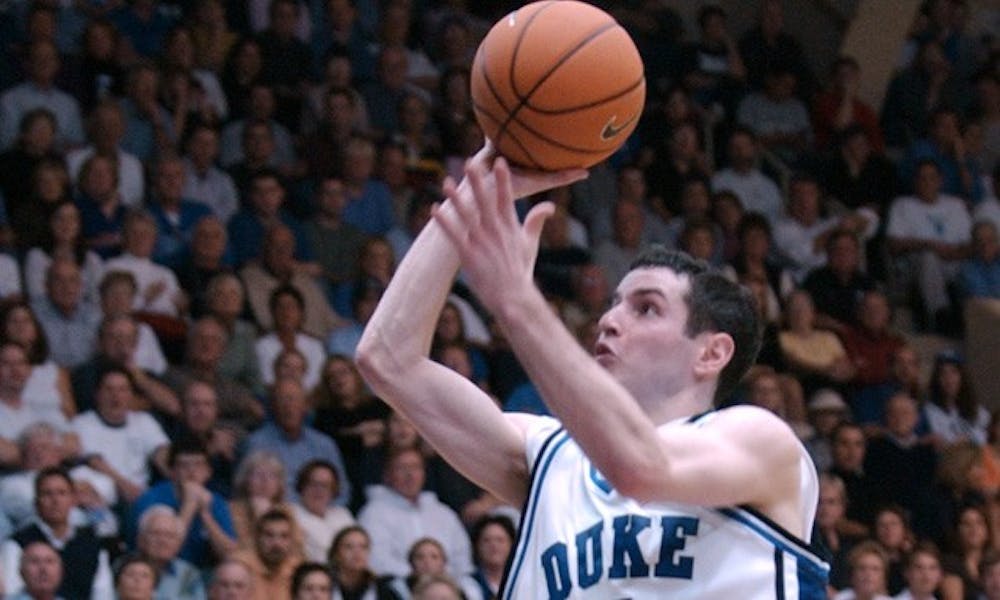So this—finally—is the end.
A mere three years after I graduated, this is almost definitely the last time I’ll write a regularly scheduled sports column in this newspaper. (Yes, that was a carefully crafted statement with a ton of wiggle room. I count no fewer than four modifiers in that sentence. Bill Clinton’s speechwriters would be proud. Hell, Brett Favre would be proud.)
I’ve written at least one story that appeared in the sports section for eight consecutive calendar years. I’ve written at least one sports column for six consecutive calendar years.
I’ve written a column about a utopian future brought about by Brian Zoubek and a column about 12 students camping out for a women’s basketball game. I’ve written two columns attempting to prove that Duke Basketball declines over the course of the season and a column suggesting that Coach K should resign. I’ve written dozens of columns that generated hate mail, and another column about the hate mail I’ve received.
I have covered men’s basketball, women’s basketball, football, men’s lacrosse, field hockey, men’s soccer, women’s soccer, volleyball, men’s golf, women’s golf, track and field, fencing, men’s tennis and women’s tennis. I wrote feature stories about Sean Dockery’s hard-knocks childhood, the post-Hoax recovery of men’s lacrosse and Lee Melchionni’s impressions. I wrote the equivalent of a novella about J.J. Redick’s career.
And there’s one thing I can say with utter certainty: I have never enjoyed anything more.
It is beyond trite, in a sports column, for the writer to relay a story about a time that someone told him that he was too talented a writer to be a sportswriter. It is beyond trite, in a sports column, to use that as a jumping-off point to talk about the majesty of sports—the smell of a freshly mowed baseball field, the sound of the crowd in Cameron Indoor, the poetry of the playaction fake.
But sometimes, what is beyond trite is also partly true.
And so it is true that I was told by my high school journalism teacher that I was too talented a writer to write about sports. She told me this quite often. I branched out into other areas, but I steadfastly remained a sportswriter. In high school, I never had the words to explain why I loved writing about sports, but I think I do now.
I don’t love sports for their majesty and grandeur. Instead, I love sports because athletic competition is nothing more than life writ infinitesimally small.
Life is complicated and difficult to understand; athletic competition is simple. Life goals are nebulous and the time horizon is long; athletic goals are easily defined over a short time period. Life is so grand as to be immeasurable; athletics are so small that they can be quantified by won-loss records and shooting percentages. Life means everything; sport, ultimately, means nothing.
But that’s not to say that sport lacks value, or that sportswriting lacks value. For me, sports—especially college sports—have always been the perfect prism through which to view life.
Some of life’s best stories are stories of growth and change. As young adults, our collegiate growth and change happened on the inside—most of us got to school, partied too much, acted like idiots and then eventually settled down. Everyone has a fascinating story, but the milestones and turning points are hard to identify, even in retrospect. Growing up is gradual, and you never know how far you’ve gone until you get there. That doesn’t make for much of a story.
Meanwhile, our athletes grow up right in front of our eyes. We watched Redick’s transformation from a head-bobbing, obnoxious freshman to a senior breaking down in tears as he talked about how important his Duke experience was to him. Our athletes’ milestones are wins and losses, minutes per game, shooting percentage. For me, the stories wrote themselves: Search Salinger’s catalog all you want, but you’ll never find a better bildungsroman than Redick’s four years at Duke.
But we don’t only get to watch our athletes come of age. Bite-size dramas play out every season. Our athletes avail us of the opportunity to see them in their greatest triumphs and greatest failures. Sports give us a window into our athletes’ souls that only the best writers can open under any other circumstances. Zoubek’s four years at Duke were worthy of Odysseus, an epic journey from injury to legend. The men’s lacrosse Rape Hoax was Southern Gothic at its finest—Faulkner couldn’t have done better.
For seven years, I wrote these stories, or perhaps more appropriately, I watched these stories happen and I wrote down what I saw.
So at the end, a thank you: To my editors, who allowed me to write; to my readers, who cared enough to read; and finally, to the athletes and coaches, who allowed me to tell their stories.
Get The Chronicle straight to your inbox
Signup for our weekly newsletter. Cancel at any time.

